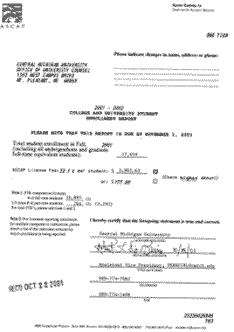Related Topics
Musical Philadelphia
Quakers never cared much for music, but the city has nonetheless musically flourished into international fame. At the same time, quarrels and internal battles have also been world class.
ASCAP Methods
Composers and performing artists are both musicians but belong to different unions, different styles of life, and different payment systems. Composers typically sell their work to publishers of sheet music, to orchestras, to producers of plays and movies, or anyone else who commissions them to write music. About 1914, they decided that wasn't fair, because it pays the same for flops and successes. Somehow, the successful composition should bring greater reward than one that fails. So, ASCAP, the Association of Composers and Publishers was formed, to collect royalties for the composers when their pieces are played. After ninety years of adjusting, their system has become fiendishly clever.

|
|
A copy of an ASCAP form used at an American university. |
Some 68,000 composers have joined the organization, and ASCAP sells annual licenses to broadcasters and producers, allowing them to perform anything registered by one of the members. ASCAP makes an approximation of what the broadcaster is likely to play in a year, and bases its license fee on that. Then, it studies the program logs and other material, and figures out how much of the fee should be credited to which composer. In a system covering millions of performances a month, there must be some inaccuracy, but there seems to be relatively little dissatisfaction among the composers, and the broadcasters are more concerned with the size of the license than the fairness of its redistribution. Since this system is obviously much more efficient than collecting fees performance by performance, the people involved and the courts which oversee the process seem to be willing to overlook minor imperfections. Even the monopoly antitrust feature was softened by the appearance of a second agency, BMI, in 1940; which now has over a third of the business.
Such a system has to be audited, to keep down the grumbling and keep away the plaintiff's lawyers. So, the fairness of the formula is tested by sampling techniques, with computers and all that. In fact, there is quite a large business of consultants who audit for a fee. Out in Darby, Pennsylvania, there is a place where teams of middle-aged ladies sit in a big open hall and watch television being piped in from all over the nation, keeping score on notepads, and turning it over to computer operators for processing. The coffee consumption in that room is simply astounding, and so they need a ten-minute break every hour, but it's considered to be a good job.
When you do a little rough maths, questions do get raised about this. Between them, ASCAP and BMI seem to assess annual fees of about $700 million and turn 80% of it back to composer members. That means that retained expenses are about $140 million. That's a trifle hard to account for, and rather strongly suggests that lobbying activities must be appreciable. The system is clever and efficient, it passes its audit checks. But the question nevertheless remains: is it legitimate? Since any question of legitimacy is ultimately determined by Congress, campaign contributions are always a wise precaution.
ASCAP keeps expanding its reach. It recently started to demand that Girl Scout camps pay for a license for their campfire singing. Before that, the last big uproar was over music played in elevators. And then, there is the perennial anecdote about Happy Birthday. Two schoolteachers in Kentucky are still being paid about $2 million a year as royalties for the playing of that song in restaurants and radio programs, and the copyright still has a couple of decades to go. It's the duration of that copyright that is the most dubious part of this business, and the one which will need the most lobbying money to justify.
Originally published: Thursday, March 08, 2001; most-recently modified: Monday, May 13, 2019